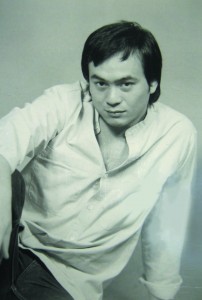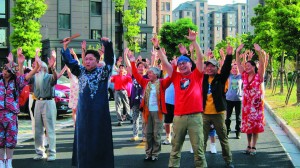Sixty-year-old rocker Simon Chung, former vanquisher of the legendary Leslie Cheung, is in the limelight again after Voice of China stint
By Katrina Lee
Dressed in a casual outfit of red T-shirt, jeans and a bandana and wearing a pair of bold square frame glasses, Simon Chung Wai-keung, took to the stage as a contestant in The Voice of China Season 2. The nationwide singing contest tops the ratings in China and at 60, Hong Kong rocker Chung was its oldest competitor.
In the second round of the competition, Chung battled with a young contestant by performing a duet of the Beatles classic Hey Jude. Chung took the lead to mentor and encourage his rival and their performance worked up to a rousing finale, with the audience swaying along to the melody and joining in singing the chorus.
Chung’s performance won him plaudits from the judges and audience alike, one of the judges was even moved to tears. But he lost out to his much younger rival, who ended up making it to the semi-finals. On the record, Chung says the elimination did not hit him hard and that enjoying his time on stage is more important than winning a title.
After all, early on in his career, he won a big award, beating the late Cantopop and movie legend Leslie Cheung Kwok-wing into second place, and harboured dreams of becoming a rock star. But life did not turn out that way.
Now, Chung says he thinks he achieved his goals on The Voice of China by showcasing his musical talent and sharing his passion for music with a large audience. He smiles proudly when he recalls the concert-like atmosphere he managed to create in the studio with his performance of Hey Jude.
The song is one of his favourites by one of his favourite bands. Chung’s love of rock ‘n’ roll was greatly influenced by the British band, whose songs were very popular when he was young. Chung says he was struck by how close to life the lyrics were and how the melodies and rhythms expressed emotions.
Chung finds pop music too restrictive, as songs must be sung smoothly and in-key. On the contrary, he says he can express his emotions and personality in more diverse ways through rock.
For Chung, being able to perform rock music is more important than being able to merely perform on stage, even though it was his determination to stick to his musical preferences that finally dashed his dreams of becoming a singer.
Back in 1977, Chung entered the Asian Music Contest held by Rediffusion Television (RTV). He took the title with his performance of These Eyes, a song by a Canadian rock band, The Guess Who. In the process, he beat another newcomer, Leslie Cheung Kwok-wing into second place. Both men were offered contracts and for Cheung, the rest was history.
But for Chung, life as an RTV artist was different from what he had expected. There were few opportunities to perform rock songs and instead the company arranged for him to lip-synch to pre-recorded songs in variety shows. “I thought being a singer would mean I could have a live concert, but it was completely different,” Chung says.
Sensing his lot would not improve, Chung quit RTV after around a year and became an insurance agent. Chung says the personal insurance industry was fairly new at the time and people in Hong Kong were not very accepting of it. “Once people heard of it [the insurance industry], they would be terrified. But I like to face challenges, so I decided to go for such a difficult job,” he says.

As Leslie Cheung’s star rose, Chung toiled away in the insurance field for more than 20 years. But he has never regretted his decision. “What you saw was the fruits of [Leslie Cheung’s] success, but what you didn’t see was the process, which was actually tough and sometimes very unhappy.”
Chung says the most amazing thing about life is that you can enjoy the process and gain satisfaction in whatever you do. He says he was content in his job as an insurance agent because he received support from his clients and rewards from his boss.
In any case, he says he never completely stepped away from music because he composed songs in his spare time and performed at the annual balls or Christmas parties of companies. Music has always been an indispensable part of his life, it was just that he temporarily let it become a side job.
Ironically, it took a bad year for Chung to start a journey that would put music first again. In 2003, Hong Kong was ravaged by Severe Acute Respiratory Syndrome (SARS) and economic recession and Chung had to develop his career in mainland China. In the same year, he was diagnosed with a serious cardiac disease and the doctor told him he had just a 50 per cent chance of survival.
After struggling for two years over whether to undergo surgery for a coronary artery bypass, Chung finally made up his mind in 2005 when his condition worsened.
As he was wheeled into the operating room, Chung says his mind turned to music. “I promised myself that if I could walk out of this hospital, I would do nothing else but go back to singing,” he says.
In 2007, after fully recovering from the surgery, Chung joined some friends to enter a national rock band competition in Guangzhou. An owner of an Irish pub in Guangzhou spotted Chung in the competition and invited him to perform at the pub.
At first, Chung and his band were ignored by the expat customers. But he managed to command their attention by performing some classic rock songs from the 1960s to 1990s. He says many people even flew to Guangzhou just to watch their performances.
In 2012, a crew from Guangdong Television came to interview him and reported on the band’s achievements. Guangdong Television then recommended the band to a production team of a Liaoning TV talent contest, The X Factor: Ji Qing Chang Xiang. Chung was invited to join the competition as a rocker.
It was his outstanding performance in the contest that drew the attention of The Voice of China producer who approached Chung and invited him to participate in the hit series. At first, he hesitated as he had already taken part in many contests after his recovery. But Chung reminded himself of how important it was to persist in the pursuit of his musical dream and decided to go for it.
“I wanted to bring out my talent in music again, I needed to have more exposure. I couldn’t just sing to myself in the bathroom. So, when there was such a big stage, I decided to give it a try,” Chung says.
Despite being knocked out, his performance touched the hearts of millions and he shot to fame overnight. His microblog now has more than 55,000 followers.
Chung’s life was turned upside down as the job offers flooded in all at once. In the past few months, he has been booked for performances in commercial events and television shows and signed for endorsement deals in fashion and car commercials. He has even made his film debut playing the role of a funny father in a teen romantic comedy produced in China, Love at Every Sight.

Currently savouring his new-found fame after The Voice of China, Chung’s working schedule is jam-packed. Without a manager to help coordinate his schedule, Chung admits the hectic life sometimes drives him crazy. But he is also enjoying what he is doing now. “It’s so rare to get such an opportunity at the age of 60,” says Chung.
With such a heavy workload, Chung now has less time to spend with his 20-year-old daughter, who he manages to meet once a month. He says they maintain a good relationship by speaking on the phone twice a week. With his daughter’s full support, Chung feels he can pursue his dream and develop his career as a singer.
Still, even with his second shot at fame, Chung has been disappointed by not being able to indulge his passion for rock. “Many producers don’t understand what is meant by rock ‘n’ roll. They still have the impression that it’s about violence and revolt, but they never know it actually represents the inner voice of a person,” Chung says.
Chung knows the only way he will be free to perform according to his heart would be to hold his own concert. Therefore, he is planning to hold his first concert in Hong Kong.
“I was born and raised in Hong Kong. If I don’t have the ability to hold a concert here, I think it is just meaningless to do it elsewhere,” Chung says.
Edited by Viola Yeh










































